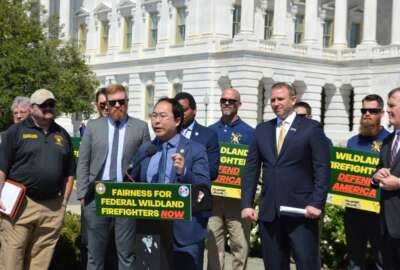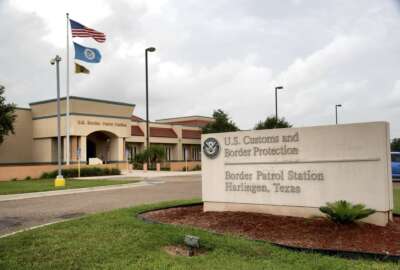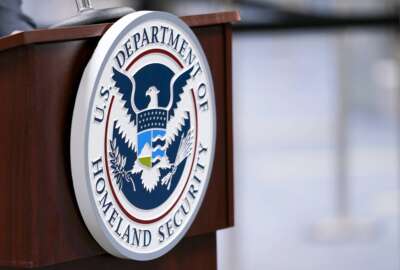Bill roundup: Committee OKs Border Patrol pay raise, CBP hiring, permanent federal firefighter raise
Bills that would set higher pay for frontline Border Patrol agents, increase hiring, and make a temporary pay raise for federal firefighters battling wildfires are...
Bills that would set higher pay for frontline Border Patrol agents increase hiring at Customs and Border Protection, and make a temporary pay raise for federal firefighters battling wildfires are all heading for a Senate floor vote.
The Senate Homeland Security and Governmental Affairs Committee advanced three bills at a markup hearing on Wednesday.
Among the bills, the committee advanced the Border Patrol Enhancement Act, which would increase the minimum pay of Border Patrol agents at a GS-12 level to receive at least a 14% pay increase.
The bill would also give the DHS secretary the authority to increase pay for other grades or levels, as well as other occupational groups.
Sen. James Lankford (R-Okla.), the bill’s sponsor, said the legislation would provide a “pay change that is long overdue for Border Patrol.”
Lankford said GS-12 Border Patrol agents, a majority of the agency’s frontline workforce, are regularly working 80-100 hours per two-week pay period, but do not get paid overtime.
“Literally at the time we’re asking more of Border Patrol, we’re not compensating them. So that is just not right to just cut off their compensation at that point,” he said.
The bill, if passed into law, would also give Customs and Border Protection 180 days to complete a study looking at Border Patrol’s personnel requirements.
Copies of the report would go to the House and Senate appropriations committees, the Office of Personnel Management and the Government Accountability Office.
The study would build off an existing five-year staffing and deployment plan CBP completed in 2013.
Sen. Kyrsten Sinema (I-Ariz.) said Border Patrol pay isn’t keeping up with what the job demands, and is hurting retention.
Sinema said Border Patrol is having trouble recruiting the next generation of agents, and that much of the current Border Patrol workforce is close to retirement age.
“We cannot wait any longer to fix our recruitment and retention challenges,” Sinema said.
Border Patrol agents, she added, previously sought waivers to stay in their positions for an extra year before having to retire. But because of lagging pay, she said “those who don’t leave for other agencies are counting down the days for their retirement eligibility.”
The committee voted down amendments from Sen. Rand Paul (R-Ky.) that would sunset the higher pay for Border Patrol agents within two years.
Paul said the amendment would give lawmakers an opportunity to revisit the issue, and determine whether the pay raise actually improves recruitment and retention.
“It could be in two years we study the situation, and we say that by giving increased overtime pay, that we employed more people, that morale was higher and there was a success. It could be we come back in two years, and inflation is 10% a year, and we find out that the overtime pay is not enough and we actually want to increase it,” Paul said. “It could be we come back in two years, and we find out they’re not doing what they’re supposed to be doing.”
The bill requires GAO to issue a report on the pay raise’s impact on the Border Patrol workforce.
Since April 2011, Congress has mandated that Border Patrol achieve an active duty presence of not less than 21,370 agents to secure the U.S. borders between the ports of entry.
The Department of Homeland Security (DHS) inspector general’s office, however, found in February 2019 that Border Patrol hiring isn’t keeping up with its rate of attrition, and that it isn’t meeting the minimum staffing requirements set by lawmakers.
CBP mandate to make 600+ hires every year
The committee also advanced the Securing America’s Ports of Entry Act, which requires CBP to hire at least 600 new officers each year, until its staffing needs are met.
The bill also authorizes CBP to hire additional support staff and technicians to perform non-law enforcement functions.
Committee Chairman Gary Peters (D-Mich.), the bill’s sponsor, said these additional support staff will allow CBP officers to focus on drug trafficking prevention and other law enforcement duties.
If CBP does not adequately increase personnel, the bill calls on GAO to report on CBP’s hiring practices.
The committee voted down an amendment by Paul that would prohibit Congress from appropriating additional funds for DHS to meet the bill’s goals.
“What would happen is the enormous, gargantuan budget of the Department of Homeland Security wouldn’t be reduced. You would just take money from somewhere in the budget to spend on these new things you want to do,” Paul said.
The committee also voted down an amendment from Paul that would transfer nearly $3 billion from the Cybersecurity and Infrastructure Security Agency to pay for the projected cost of the bill.
Paul said there is “adequate money in CISA” to offset the cost of hiring more CBP personnel.
“We should look at the entire CISA budget and decide what is appropriate spending, what is not appropriate spending. Is this spending more valuable than the other?” Paul said.
Peters, however, opposed the amendment and said Congress doesn’t have to choose between funding border security and cybersecurity.
“We should not have to choose between protecting our critical infrastructure or securing our borders. I believe we can do both,” he said.
A permanent pay raise for federal wildland firefighters
The committee also approved the Wildland Firefighter Paycheck Protection Act, which would make a temporary pay raise for about 18,000 federal firefighters permanent.
Under the Bipartisan Infrastructure Law, federal wildland firefighters saw either a $20,000 or 50% boost to their base salary — whichever was lower. The temporary raise for firefighters, however, is set to expire in September.
Prior to the pay raise going into effect, the starting salary of a federal wildland firefighter was less than $15 an hour.
Agency leaders and firefighter associations urged the Senate Energy and Natural Resources Committee at a June hearing to avert this “pay cliff” to avoid a mass exodus of federal wildland firefighters.
Randy Erwin, national president of the National Federation of Federal Employees, said the Bipartisan Infrastructure Law gave wildland firefighters a “life-changing” pay raise, and that letting that pay raise lapse would decimate the workforce.
“It will make it impossible for us to contain the wildfires that we have in this country, if that happens,” Erwin said in an interview Wednesday.
About 24 large, active fires are currently burning across seven states, and is putting a considerable toll on the workforce.
“People are leaving the Forest Service in droves. There’s a multitude of reasons, but the first and foremost is low pay and uncertainty about pay,” Erwin said.
Erwin said if the pay raise lapses, a “huge percentage” of the workforce — “maybe 30%, maybe 50%, maybe more than that” — would probably leave federal service and would seek jobs at state fire agencies, or leave the industry altogether.
“This is a tough job. You just can’t expect to pay people peanuts and expect them to carry on in these jobs,” he said.
Copyright © 2025 Federal News Network. All rights reserved. This website is not intended for users located within the European Economic Area.
Jory Heckman is a reporter at Federal News Network covering U.S. Postal Service, IRS, big data and technology issues.
Follow @jheckmanWFED






